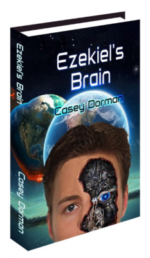Could humans disappear from earth? Far-fetched as it sounds, the chances of such an outcome are not as small as some might think. Stephen Hawking has said we must leave earth to survive as a species. “Our only chance of long-term survival is not to remain inward-looking on planet Earth, but to spread out into space.” Hawking foresaw a number of disasters, including climate change and nuclear war, that could make earth unlivable for humans. Elon Musk agreed. His hope is to colonize Mars, establishing an outpost for humans when earth becomes uninhabitable, or when the earth-bound species destroys itself in war. Kim Stanley Robinson’s Red, Green and Blue Mars series depicts the difficulties, and perhaps futility of terraforming Mars to accommodate humans. His recent The Ministry for the Future had humans facing the climate challenges and beating them, avoiding having to leave the planet.
Instead of, or in addition to leaving a toxic earth, some writers have focused on adapting the species. In 1930, in his classic novel, Last and First Men, Olaf Stapleton predicted that our current species is only the first in a long line of adaptations that will allow us to survive for millions, if not billions of years. More recently, Richard Morgan described a future in which humans achieve immortality by uploading their minds into new bodies, an option available only to the rich and powerful. His Altered Carbon became not just a hit novel, but a hit television series.
Humans are not limited by evolution. We have the intelligence and technical skill to alter our genes, to clone ourselves, and to merge ourselves with machines. We can create planned adaptations in ourselves. Uploading our conscious minds into computers is one avenue that, while no doubt decades in the future, is plausible. In Permutation City, Greg Egan shows us one version of how such a scenario might unfold. In his story, the adaptational capacity of the computer programming that allows uploaded minds to inhabit virtual worlds of their choosing creates a competitor for humans, which proves more than our species is able to handle.
While uploading people’s minds into computer circuits might solve the problem of dying from organic causes, it does nothing to change human nature, which thinkers such as Hawking and Musk blame for the demise of our species here on earth. Androids with uploaded minds from real humans will still carry on wars, pollute the atmosphere and kill each other. Being stronger, less vulnerable, and able to think faster than ordinary humans, they very well might hasten the process of making earth uninhabitable or destroying each other.
In Ezekiel’s Brain, I’ve explored the topic of an uploaded brain, an artificial intelligence (because it is not organic) that is an emulation of a human brain. But, as is likely to be the case, by the time the brain circuit copying technology is sophisticated enough to copy a real human brain and duplicate it in silicon circuits, our computer technology will likely have progressed to the point of being able to construct artificial intelligences that are at least as smart as humans, if not smarter, without copying their brains. Who will be dominant, the AIs that are copies of human brains or AIs that are pure artificial intelligence, who think differently than humans? Such beings, which is what they will be if they are conscious, will not share human nature, but what nature will they possess? Will they be friendly toward humans? Will they see any value in preserving the human species—even just its minds?
These are the questions asked in Ezekiel’s Brain. It is fiction—science fiction—but the possibilities it explores are real possibilities. They could determine the survival of the human species.
Ezekiel’s Brain is available on Amazon
“Ezekiel’s Brain does exactly what a piece of speculative fiction should: it delights in being thought-provoking, ranging over issues in AI, neuroscience, politics and philosophy, and at the same time takes the reader on a high octane narrative journey.”
Bernard Beckett, author of the scifi classic, Genesis

Not already a subscriber to Casey Dorman’s fan page newsletter? To subscribe or share with others CLICK HERE




